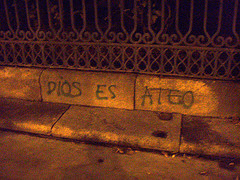Sep 7, 2010 Comments Off on Be Your Self
Be Your Self
 Had He willed they would not have been idolators. – Sura 6, “The Cattle”
Had He willed they would not have been idolators. – Sura 6, “The Cattle”
The existence of evil, or, more banally, base disobedience of God’s word by the vast multitude of human beings, must in some ways be explained by monotheism. If God is all-powerful, in fact, singular in His omnipotence, how do you explain the existence of evil without admitting that it too, like all else above and below, was created by God?
Similarly, since God has sent down his Word and therewith his Law via sundry emissaries, how is it that so many, indeed the majority of humanity, either fail to heed it or denounce it as false (adhering instead to their own regional or familial creeds)?
The idea that God created evil (the Devil, drives, temptation) and then bestowed Free Will upon Man in order to test his fidelity seems far-fetched. Why would an all-powerful Being operate in such a neurotic (or, really, passive aggressive) fashion?
The alternative (if you are not going to jettison monotheism altogether and retreat into a polytheism that does not suffer this conundrum) is to state forthrightly that God created Evil and, moreover, that God determines who will obey and who will not.
Hence the Calvinist doctrine of pre-destination, for example, or, a thousand years before it, the words of the Holy Quran where we find in Sura 7, “The Wall Between Heaven and Hell,” Aya 178: He alone is guided whom God shows the way; and whom He leads astray is surely lost. (This is echoed later, in Aya 186, “Whosoever God allows to go astray has none to show him the way, for He leaves them to wander perplexed in their wickedness.” and indeed repeated throughout the Quran.)
“Whom He leads astray….” How many can get to that and appreciate and worship a God who willfully leads some astray? Of course, Islam aside, how else are we to understand the monotheism espoused my Judaism or Christianity (or Zoroastrianism, if you want to get technical)?
And have many considered that, when we look out over the vast sweep of history, broadly speaking, or burrow into the unique experiences of every individual who has ever lived, we would not be able, following the model of monotheism offered in the verses cited above, to distinguish a reality created by God from a reality which has unfolded in His absence?
In other words, truly consistent monotheism and atheism, from the standpoint of observable reality, are indistinguishable.
Which brings us to the preeminent secular commandment: “Be Yourself” – a notion emanating from Emerson and Nietzsche, sacralized in the Sixties (not to mention countless movies, sitcoms, and television dramas), and now central to the concept of authenticity that the social media gurus of today wield like an iron hammer.
You are as God wills you to be. Thus, when you are “yourself,” you are submitting to the will of God, as is proper. However, when you are not yourself, then you are also obeying the will of God, since you could only not be yourself if He willed it to be so.
We can no more escape ourselves than we can act against the will of God. You are always already yourself, even when you are not. If God wills you to not be yourself, than “not being yourself” is how you are.
And therefore, I believe, the insistence on “being yourself” is really driven by the frustration and disappointment associated with the fact that this is, in fact, impossible.
Image source: mrmystery.
